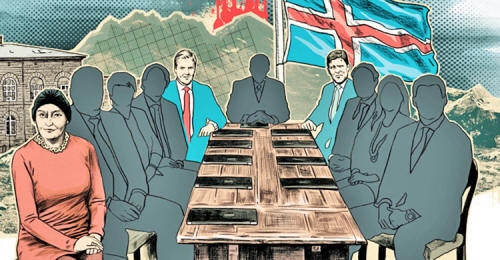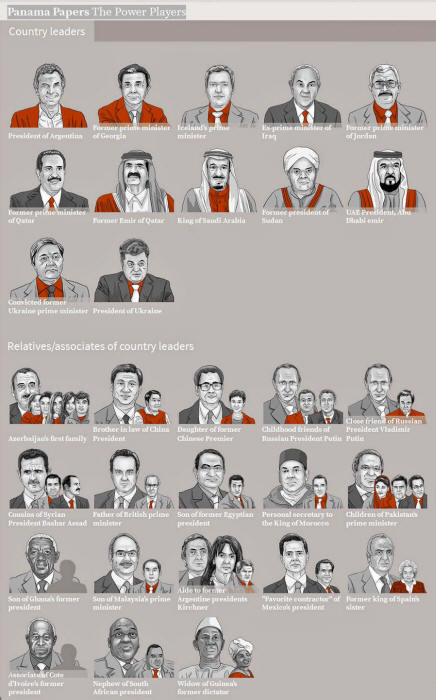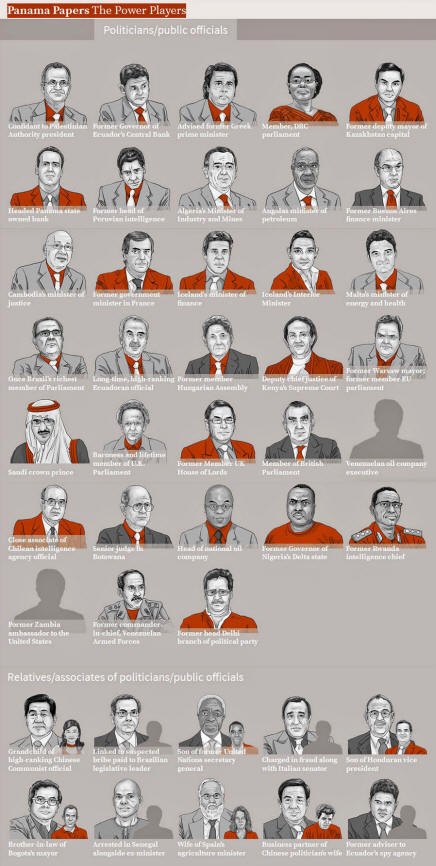|
from TheRules Website
'I merely want to remind you to think about the corruption systemically.' (Image: via TheRules)
Over the weekend, an historic release of information came out in the Panama Papers showing exactly who, how, and when a vast network of people stole and hoarded money.
Our minds easily grok the realities of Vladimir Putin embezzling a billion dollars through offshore accounts or the Prime Minister of Iceland stealing cash from public coffers.
Where we fail more easily is visualizing the system of shell companies, accounting tools, trade regimes, tax havens, and legislative changes that make up the system of wealth extraction all of these individuals are using in collaboration with their partners in crime.
As the media is quite likely to frame the Panama Papers as a few bad apples using legal financial instruments, I would like to offer an alternative that keeps our mental eye on the ball.
What really matters is the architecture of wealth extraction that has been systematically built up in every country around the world.
I use the word 'architecture' intentionally here for two reasons to remind us that:
"What really matters is the architecture of wealth extraction that has been systematically built up in every country around the world... The purpose of this system was to hoard as much wealth as possible in the hands of a tiny elite."
This is what my colleagues at The Rules have been calling the Story of Poverty Creation when we write about the unnamed development agenda that goes by the name of economic growth.
Ask yourself the question "What really grows, when we grow the economy?" (below video) and ponder how it is that three years ago there were 300 people who had the same aggregate wealth as 3 billion:
Today it is even worse - 62 individuals have the same total wealth as 3,700,000,000.
We are fools to think this happened by accident.
There was a long history of colonialism and slavery that gave certain Western nations a huge amount of wealth that has since been used to rig global institutions like the International Monetary Fund and the World Bank in a manner that keeps this historic trend going strong.
In the mid-20th Century it was the banana republics, where US corporations benefited from the displacement of democratic leaders with despotic dictators throughout Latin America (with help from a network of financiers and government aid).
The decades that followed saw the rise of "free trade" zones and "structural adjustment" programs that guaranteed a one-way transfer of wealth from poor countries to the pockets of the extreme rich in wealthy countries (while ignoring the colonial period that set up this economic advantage in the first place).
Lest we forget this recent history - or more egregiously, that many of us never learned it in our corporate-influenced public school programs - the pattern continues now in the form of the Trans-Pacific Partnership and the newly minted Sustainable Development Goals of the United Nations that fail to acknowledge the existence of this vast architecture of wealth extraction.
Our ignorance of the past is what keeps us from seeing that "progress" in the current economic paradigm is nothing more than the spread of a cancerous parasite through the body politick that threatens to take down our entire global economy.
Inequality, it turns out, is about much more than social justice.
It is a measure of social health and well-being that tells us how likely it is for a violent rebellion, the rise of militant extremism, emergence of a fear-mongering dictator, or civil war.
So as you read about the Panama Papers, I merely want to remind you to think about the corruption systemically.
For this is the only way to see how we can begin the work of systematically dismantling it. Getting rid of a few bad apples will only perpetuate the Gospel of Greed that these individuals serve using the tools of corporate charters, trade agreements, accounting systems, and so forth.
Luckily, there is a solution to this mess - and it comes out of research in evolutionary game theory.
When corrupt individuals get away with their bad deeds without being punished, this encourages other greedy people to go along with this new social norm (and for those who might prefer to cooperate who now feel the need to compete in the rigged system).
A runaway pattern ensues whereby many people "defect" from being good citizens and the corruption becomes systemic.
The way to deal with this situation is simply to add punishment as the 'countervailing system' and the defections will soon come to a halt in the context of the pro-social norms of cooperation that are now enforced by society.
A truism of the human condition is that we are quick to anger when we feel cheated by another. This social morality is quite natural and has a long history in our evolutionary past.
Let us use this moral compass now to guide us through the changes that must come - changes to the rules that structure our economic and political systems for wealth extraction and hoarding - so that our societies become more healthy, more functional, less corrupt, and better able to serve all of us living together on this densely populated planet we call home.
Onward, fellow humans...
- Biggest Leak in History Exposes Global
Corruption -
from
TheHackerNews Website
A huge trove of confidential documents from the Panamanian law firm Mossack Fonseca was made public on Sunday in what's known as One of the World's Largest Data Leaks ever, called The Panama Papers.
Over 11.5 Million Leaked Files including 2.6 Terabytes of Data
Even larger than the NSA wires leak in 2013, the Panama Papers includes 2.6 Terabytes of private data, exposing an enormous web of offshore shell companies frequently used by many of the richest and most powerful members around the globe to evade taxes, hoard money, and skirt economic sanctions.
Shared with German newspaper 'Suddeutsche Zeitung' by an anonymous source, the leaked documents then passed on to the International Consortium of Investigative Journalists (ICIJ) - in which 370 Reporters from 100 News Media organizations looked into the massive leak for a year.
After a year-long investigation, ICIJ and its reporting partners began publishing a series of leaks on Sunday based on the Panama Papers, which involves more than 11.5 Million files including emails, invoices and bank records, and implicates 72 current and former heads of state.
World's Top Leaders and Rich Personalities Exposed
According to ICIJ, the leaked documents range from 1977 to December 2015 and include details on 214,000 offshore shell companies with links to 140 politicians including,
The Panama Papers has unearthed 12 current and former world leaders, including monarchs, presidents, and prime ministers, who have been using offshore tax havens, including a $2 Billion paper trail that leads to Russian President Vladimir Putin.
Though Putin himself isn't directly implicated in the leak, a number of his family members and close friends are involved and are listed in the Panama Papers massive leak.
The leak exposed that Sergey Roldugin, one of Putin's oldest friends, owns 3 offshore companies worth over $100 Million:
The Panama Papers also include details on at least 33 people and enterprises blacklisted by the United States, including Mexican drug lords and a number of terrorist organizations.
Over 500 Indians Figure on the List
According to the German newspaper, Mossack Fonseca is the world's fourth-biggest offshore law firm that enables their clients to keep their financial affairs secret, no matter how shady, citing some of its clients, which include "criminals and members of various Mafia groups," along with government officials and their relatives and close associates.
The Panama Papers leak also revealed that some global banks including,
...and others have worked with Mossack Fonseca to create offshore accounts.
In response to the ICIJ's report, Mossack Fonseca issued a statement saying that the firm, as a registered agent, is only helping its clients incorporate companies and that it conducts thorough due diligence in every case it meets and quite often exceeds all relevant local rules, regulations and standards to which the firm is bound.
|





